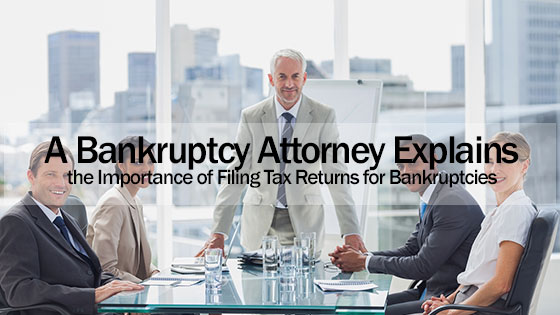Individuals that find themselves underwater financially to the point of considering bankruptcy have a number of pertinent issues to address. One of these issues is the impact a bankruptcy will have on tax returns and tax filing statuses.
The manner in which an individual must approach the filing of taxes after a bankruptcy will be determined by which chapter of the federal bankruptcy codes a petitioner chooses to utilize. The Law Offices of David Kohm have many expert bankruptcy attorneys that can assist in providing the necessary legal advice an individual needs.
Chapter 7
The option to file Chapter 7 bankruptcy is available to individuals that find they are no longer able to meet debt requirements and failed businesses, and they are in need of protection from creditors. When a Chapter 7 bankruptcy is filed, a trustee is appointed by the court who will then liquidate any non-exempt assets owned by the debtor to make payment on the outstanding debt. The court may also choose to discharge many unsecured debts.
Individuals involved with the process of Chapter 7 bankruptcy would file a regular 1040 tax return. Additionally, the trustee that was appointed by the court is required to file a Form 1041 for any bankruptcy tax estate that generated more than $10,400 in the last year.
Tax refunds are allowable after filing a Chapter 7 bankruptcy but can be taken by the trustee if not designated as exempt by the court.
Individuals that experience a difficult time satisfying tax payment requirements following a bankruptcy should seek the aid of a skilled bankruptcy attorney.
Chapter 13
The most common type of bankruptcy filed is a Chapter 13 bankruptcy and this method is only available to individuals. Petitioners with regular income that file under Chapter 13 bankruptcy protections will be afforded the opportunity to use a payment plan to repay all or a portion of their debts over a term of three to five years. Individuals that successfully complete their repayment plan will be awarded a discharge of debt.
The criteria to file Chapter 13 bankruptcy is the presence of a regular income, along with the possession of tax returns for each of the four years preceding the bankruptcy filing.
Filers of Chapter 13 bankruptcy petitions are not required to designate their estates as a separate entity when filing their yearly tax return. There is no reason to change the 1040 form the individual would normally use following a Chapter 13 bankruptcy filing.
Income and expenses should be reported on tax forms as usual and any debt forgiveness the filer has received as a result of the bankruptcy petition is not income that is required to be included for tax reporting purposes.
In some cases, federal income taxes owed may be discharged as part of a Chapter 13 agreement with the court but this is on a case by case basis. A bankruptcy attorney with in-depth knowledge of this area of the law should be consulted in these matters.
A few things should be kept in mind for individuals that are considering the option of a Chapter 13 bankruptcy filing.
- All state, local, and federal tax returns that are due must be filed, or an extension requested following the bankruptcy petition being filed
- Chapter 13 petitions do not prevent income tax refunds from being intercepted by the IRS and applied to prior tax liability
- Tax liability that is accrued after the filing should be paid as normal
- Failing to file a return or choosing not to pay outstanding taxes can result in bankruptcy petitions being dismissed by the court
The regulations pertaining to tax procedure following a bankruptcy filing involves a complex process that individuals should not approach alone. The help of a qualified bankruptcy attorney that is both able and dedicated to the protection of their interests is suggested. Individuals in Texas can satisfy this need for counsel by reaching out to the Law Offices of David Kohm.
Call our law offices today at any of our convenient locations and get a free consultation.
Arlington (817) 522-4451
Denton (940) 222-4060
Dallas (972) 362-6848
Fort Worth (817) 764-1375
Cedar Hill (972) 338-9427
McKinney (469) 522-3688
Lewisville (972) 354-4605
Frisco (972) 725-7681
You can also contact us online by using our quick contact form.











